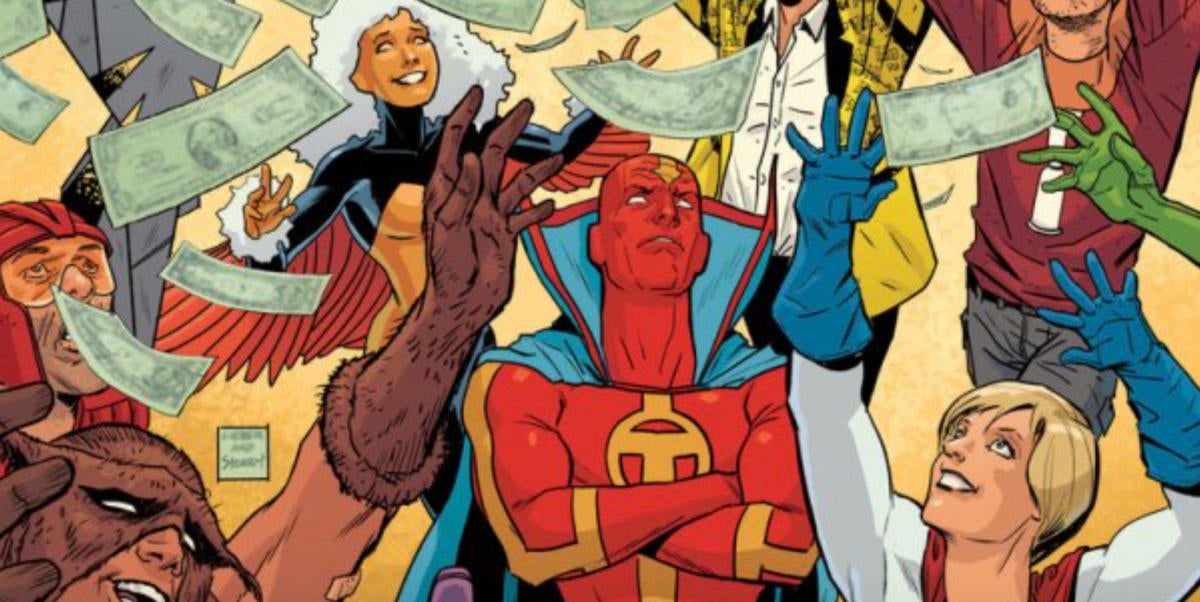The cover of One-Star Squadron #1 offers readers a thesis statement for the story begun inside. Colorfully costumed heroes from DC Comics C-list (or below) reach ecstatically for falling dollar bills, most of thems ones and fives, while only Red Tornado looks up with arms crossed in skepticism. For all of the rhetoric found in superhero comics about doing good, there’s very little of that ethos reflected in the stories, industry, or culture that produces these superhero comics. Instead, superhero narratives are formed by whatever is perceived as profitable and the same goes for the treatment of creators and anyone else who contributes. Whether one describes it as being hypocritical or paradoxical, it’s troubling because “good” has nothing to do with these morality plays. That’s what two of the most critically-acclaimed humorists in the medium, artist Steve Lieber and writer Mark Russell, aim to address in One-Star Squadron #1, and the debut suggests they’ll succeed in delivering equal amounts of laughter and desperation in this black comedy.

One-Star Squadron #1 introduces readers to HEROZ4U, an employment agency for minor heroes deploying them in call centers, personalized videos, promotional appearances, and other forms of barely-dignified work. The outfit is run by Red Tornado, a weather-controlling android and former member of the Justice League, and populated with barely-recognizable figures like Minute Man, Flying Fox, and Heckler. They occupy a generic suburban retail space filled with ephemera of American office life – cramped cubicle quarters, bland, beige walls and ceilings, and motivational posters that do more to depress than inspire. Although the initial incongruity of superheroes and mediocre office spaces is amusing, it’s the careful observation of pointless work that makes this setting genuinely humorous.
After the issue opens with a splashy video advertising HEROZ4U’s soul-crushing office space, it cuts to Red Tornado behind a desk addressing issues that could not be any further from the definition of “importance.” While addressing the complaints of a disgruntled employee and snarfing down a fast food lunch, Red is asked why he became a hero, and it’s in the space between the meaningful life he imagined as a hero and what he is actually tasked with doing that One-Star Squadron lives. It’s a space that reflects millions of Americans trained to be teachers, nurses, EMTs, and other vital, life-changing roles stuffed into positions that undermine the purpose of those professions or unable to even find potentially meaningful work. Plenty of readers will recognize the exasperation and reluctance on Red’s face.
It’s this resistance to a bland, profit-motivated role that leads Red out of the office and initiates the miniseries’ plot when an unhoused Gangbuster with severe memory loss is deposited at the front doors of HEROZ4U with no idea about where he belongs. Readers see a man who dedicated himself to heroism left abandoned by society with medical professionals promptly removing the uninsured man from care. The landscape around this slow discovery of Gangbuster’s broken state is undeniably dark, made palatable by the consistent humor applied in the corners of the world. Lieber and Russell discover sparks of absurdity that do not undermine the series’ focus, but instead highlight the madness of this condition.
And One-Star Squadron #1 is a very funny debut. While it lacks the non-stop madcap antics of Superman’s Pal Jimmy Olsen, it never lets a page go by without observing the humor of this arrangement, often at the very same moment it highlights a particularly dark theme. As nurses prepare to shove Gangbuster into the street, their dialogue is so callous as to demand a bittersweet bark of laughter. Lieber’s mastery of expressions and body language in his artwork is essential to this effect, allowing a sideways look or shrug to carry a joke and never forcing “fun” to the forefront of a scene. Oddities and cruel absurdity are baked into these characters and their world, which allows plenty of space to invest in them all despite the obvious genre elements of unreality.
One-Star Squadron #1 presents two comics creators already acclaimed for their sense of humor, comics craft, and ability to engage complex themes preparing a narrative that demands all of those skills. It is difficult to create a genuinely funny comic book, but they deliver genuine laughs on nearly every page while reflecting some of the most dehumanizing elements of modern life. For that reason alone One-Star Squadron #1 is a genuinely impressive debut and with so much established so well in these early pages, it seems this series may be bound for the greatness which eludes its heroes.
Published by DC Comics
On December 7, 2021
Written by Mark Russell
Art by Steve Lieber
Colors by Dave Stewart
Letters by Dave Sharpe
Cover by Steve Lieber and Dave Stewart
Stay connected with us on social media platform for instant update click here to join our Twitter, & Facebook
We are now on Telegram. Click here to join our channel (@TechiUpdate) and stay updated with the latest Technology headlines.
For all the latest Comics News Click Here
